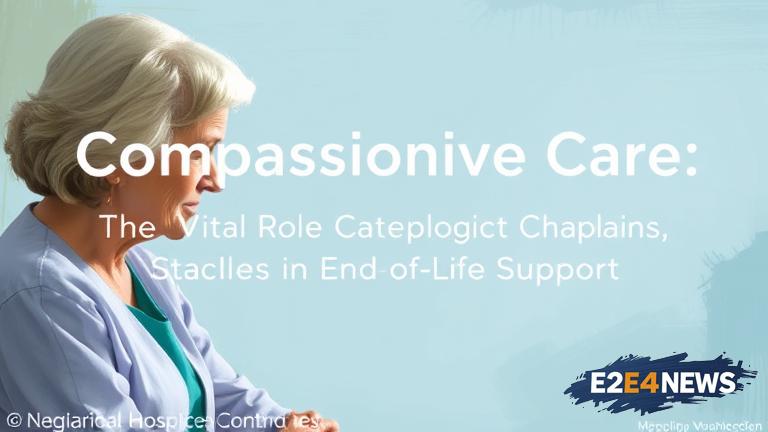Hospice chaplains play a crucial role in providing emotional and spiritual support to patients and their families during the end-of-life journey. These compassionate caregivers offer a unique blend of spiritual guidance, emotional comfort, and practical support, helping patients to navigate the challenges of terminal illness with dignity and peace. By being present and fully engaged with patients, hospice chaplains create a safe and non-judgmental space for individuals to express their feelings, fears, and hopes. This empathetic approach enables patients to confront their mortality with courage and resilience, surrounded by loved ones and a supportive care team. Hospice chaplains work closely with interdisciplinary teams, including doctors, nurses, and social workers, to ensure that patients receive comprehensive and holistic care. They also provide guidance on advance care planning, helping patients to make informed decisions about their end-of-life care and ensuring that their wishes are respected. Furthermore, hospice chaplains offer bereavement support to families and loved ones, helping them to cope with the loss of a loved one and navigate the grieving process. This support can be particularly important in the days and weeks following a patient’s passing, as families come to terms with their loss and begin to rebuild their lives. In addition to their work with patients and families, hospice chaplains often provide education and training to healthcare professionals, promoting a deeper understanding of the spiritual and emotional aspects of end-of-life care. By sharing their expertise and experience, hospice chaplains help to create a more compassionate and supportive care environment, one that prioritizes the needs and dignity of patients and their loved ones. The work of hospice chaplains is not limited to any particular faith or spiritual tradition, but rather is focused on providing support and comfort to individuals from diverse backgrounds and belief systems. This inclusive approach recognizes that spirituality is a fundamental aspect of human experience, and that patients and families have the right to receive care that respects and honors their unique values and beliefs. As the demand for hospice care continues to grow, the role of hospice chaplains is becoming increasingly important, providing a vital link between the medical and spiritual aspects of end-of-life care. By working together with healthcare teams and community organizations, hospice chaplains can help to create a more compassionate and supportive care system, one that prioritizes the needs and dignity of patients and their loved ones. In the United States, hospice chaplains are certified by the National Association of Catholic Chaplains or the Association of Professional Chaplains, ensuring that they possess the necessary education, training, and experience to provide high-quality care. The certification process involves completing a master’s degree in divinity or a related field, as well as completing a clinical pastoral education program and obtaining board certification. Hospice chaplains must also complete ongoing education and training to stay current with best practices and advances in the field. Despite the many rewards of this work, hospice chaplains often face significant challenges, including compassion fatigue, burnout, and secondary trauma. To mitigate these risks, hospice chaplains must prioritize self-care and seek support from colleagues, supervisors, and mental health professionals. By taking care of themselves, hospice chaplains can maintain their physical, emotional, and spiritual well-being, ensuring that they are able to provide the best possible care to patients and families. In conclusion, the role of hospice chaplains is a vital one, providing emotional and spiritual support to patients and their families during the end-of-life journey. By working together with healthcare teams and community organizations, hospice chaplains can help to create a more compassionate and supportive care system, one that prioritizes the needs and dignity of patients and their loved ones. As the demand for hospice care continues to grow, the importance of hospice chaplains will only continue to increase, providing a vital link between the medical and spiritual aspects of end-of-life care.





